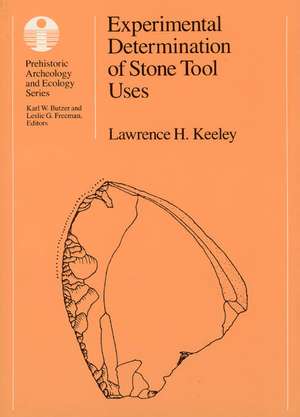Experimental Determination of Stone Tool Uses: A Microwear Analysis: Prehistoric Archeology and Ecology series
Autor Lawrence H. Keeleyen Limba Engleză Paperback – 29 feb 1980
A major problem confronting archeologists is how to determine the function of ancient stone tools. In this important work, Lawrence H. Keeley reports on his own highly successful course of research into the uses of British Paleolithic flint implements. His principal method of investigation, known as "microwear analysis," was the microscopic examination of traces of use left on flint implements in the form of polishes, striations, and breakage patterns.
The most important discovery arising from Keeley's research was that, at magnifications of 100x to 400x, there was a high correlation between the detailed appearance of microwear polishes formed on tool edges and the general category of material worked by that edge. For example, different and distinctive types of microwear polish were formed during use on wood, bone, hide, meat, and soft plant material. These correlations between microwear polish and worked material were independent of the method of use (cutting, sawing, scraping, and so on). In combining evidence of polish type with other traces of use, Keeley was able to make precise reconstructions of tool functions. This book includes the results of a "blind test" of Keeley's functional interpretations which revealed remarkable agreement between the actual and inferred use of the tools tested.
Keeley applied his method of microwear analysis to artifacts from three excavation sites in Britain—Clacton-on-the-sea, Swanscombe, and Hoxne. His research suggests new hypotheses concerning such Paleolithic problems as inter-assemblage variability, the function of Acheulean hand axes, sidescrapers, and chopper-cores and points the way to future research in Stone Age studies.
The most important discovery arising from Keeley's research was that, at magnifications of 100x to 400x, there was a high correlation between the detailed appearance of microwear polishes formed on tool edges and the general category of material worked by that edge. For example, different and distinctive types of microwear polish were formed during use on wood, bone, hide, meat, and soft plant material. These correlations between microwear polish and worked material were independent of the method of use (cutting, sawing, scraping, and so on). In combining evidence of polish type with other traces of use, Keeley was able to make precise reconstructions of tool functions. This book includes the results of a "blind test" of Keeley's functional interpretations which revealed remarkable agreement between the actual and inferred use of the tools tested.
Keeley applied his method of microwear analysis to artifacts from three excavation sites in Britain—Clacton-on-the-sea, Swanscombe, and Hoxne. His research suggests new hypotheses concerning such Paleolithic problems as inter-assemblage variability, the function of Acheulean hand axes, sidescrapers, and chopper-cores and points the way to future research in Stone Age studies.
Din seria Prehistoric Archeology and Ecology series
-
 Preț: 291.10 lei
Preț: 291.10 lei -
 Preț: 315.80 lei
Preț: 315.80 lei -
 Preț: 259.20 lei
Preț: 259.20 lei -
 Preț: 273.06 lei
Preț: 273.06 lei -
 Preț: 257.00 lei
Preț: 257.00 lei -
 Preț: 319.65 lei
Preț: 319.65 lei - 19%
 Preț: 174.85 lei
Preț: 174.85 lei
Preț: 291.69 lei
Nou
Puncte Express: 438
Preț estimativ în valută:
55.81€ • 60.82$ • 47.03£
55.81€ • 60.82$ • 47.03£
Carte tipărită la comandă
Livrare economică 23 aprilie-07 mai
Preluare comenzi: 021 569.72.76
Specificații
ISBN-13: 9780226428895
ISBN-10: 0226428893
Pagini: 226
Ilustrații: 142 figures, 115 plates, 35 tables
Dimensiuni: 171 x 241 x 23 mm
Greutate: 0.44 kg
Editura: University of Chicago Press
Colecția University of Chicago Press
Seria Prehistoric Archeology and Ecology series
ISBN-10: 0226428893
Pagini: 226
Ilustrații: 142 figures, 115 plates, 35 tables
Dimensiuni: 171 x 241 x 23 mm
Greutate: 0.44 kg
Editura: University of Chicago Press
Colecția University of Chicago Press
Seria Prehistoric Archeology and Ecology series
Notă biografică
Lawrence H. Keeley is professor of anthropology at the University of Illinois at Chicago Circle.
Cuprins
Series Editors' Foreword
Preface
Acknowledgments
1. Technique and Methodology in Recent Microwear Studies
2. Implement Preparation, Microscopy, and Photonicrography
3. The Experimental Program and Its Results
4. The Selection of Archeological Collections for Microwear Study
5. A Microwear Analysis of Flint Artifacts from the Golf Course Site, Clacton-on-Sea (Essex)
6. A Microwear Analysis of Flint Artifacts from the Lower Loam at Swanscombe (Kent)
7. A Microwear Analysis of Flint Artifacts from Hoxne (Suffolk)
8. Areas for Future Research and Some Speculations
9. Summary and Conclusions
Appendix: List of Experimental Implements
Bibliography
List of Plates
Index
Preface
Acknowledgments
1. Technique and Methodology in Recent Microwear Studies
2. Implement Preparation, Microscopy, and Photonicrography
3. The Experimental Program and Its Results
4. The Selection of Archeological Collections for Microwear Study
5. A Microwear Analysis of Flint Artifacts from the Golf Course Site, Clacton-on-Sea (Essex)
6. A Microwear Analysis of Flint Artifacts from the Lower Loam at Swanscombe (Kent)
7. A Microwear Analysis of Flint Artifacts from Hoxne (Suffolk)
8. Areas for Future Research and Some Speculations
9. Summary and Conclusions
Appendix: List of Experimental Implements
Bibliography
List of Plates
Index
